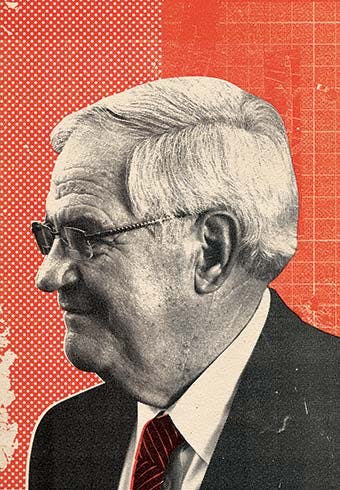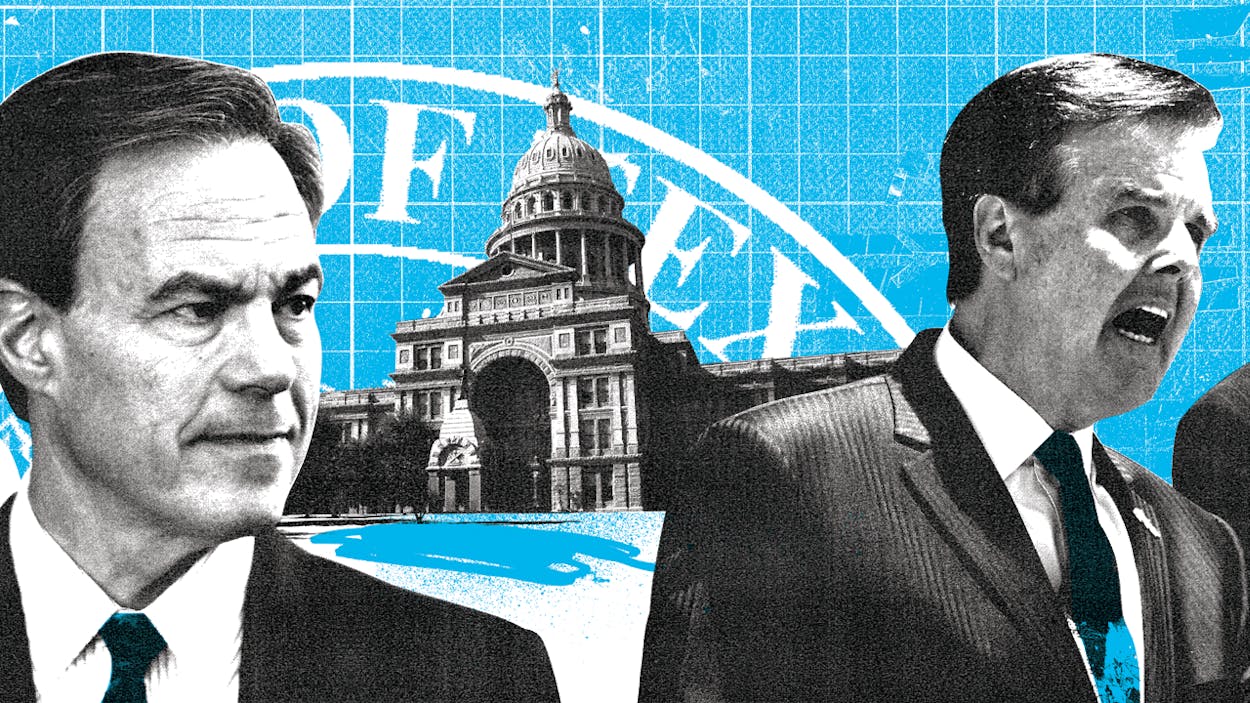The Eighty-fourth Legislature was like a professional baseball team that had just seen many of its starters retire—or not have their contracts renewed by management. In the most dramatic changing of the guard in more than a decade, Texas elected a new governor, lieutenant governor, attorney general, comptroller, agriculture commissioner, and land commissioner (whose last name happens to be Bush, lest things become too unfamiliar). In the House and the Senate, a number of powerful committees in both chambers had new chairs, including House Appropriations and Senate Finance, which are responsible for the budget. As with any team, there were clutch hits, some dramatic runs, and a couple of embarrassing errors. The session started on an uneasy note. Gun advocates descended on the Capitol in a show of force that led to heightened tension among some members. In one episode, open carry advocates entered the office of a state representative, and an unsettling exchange occurred before they finally left. Not long after that, another state representative made ignorant comments about Muslim Americans and asked her staff to have visitors to her office renounce terrorism and swear allegiance to the United States (more about that in the Worst list). The weirdness continued when a conservative group announced that it had shot more than eight hundred hours of video of members and lobbyists in compromising positions—but then didn’t release any of it. Once the Legislature settled in, however, the session lacked the fireworks seen in previous years. By far the most interesting dynamic was the relationship between Governor Greg Abbott, Lieutenant Governor Dan Patrick, and veteran Speaker of the House Joe Straus. For a time it appeared that sharp differences in the Senate and House tax plans would bring the whole session down, but in the end the argument was resolved, and the Lege was able to send a budget, which included $3.8 billion in tax relief, to the governor’s desk and avoid a special session. As the calendar wound down, lawmakers passed a contingent of bills that balanced red-meat politics with public policy investment. There was money for border security—and funding for pre-kindergarten education. There were bills for open carry and campus carry—and $3.1 billion for university construction projects. The Legislature could also check off a box related to transportation. In the end, it did not move forward on school vouchers or the abolition of the DREAM Act for undocumented students who want to attend public universities. As with every session since its founding, Texas Monthly was at the Capitol to cover the proceedings from the opening gavel to sine die. Over the 140 days of the Eighty-fourth Legislature, our team stayed late on the floor of the House and the Senate, watched countless committee hearings, and ate way too many meals in the Capitol Grill with staffers, lobbyists, and interested observers. All of that reporting culminates in our biennial list of the Ten Best and the Ten Worst legislators. We are not interested in ideology or grandstanding; we follow the major issues and look for those lawmakers who are thoughtful, trustworthy, and willing to work cooperatively with other members to make Texas a better place. That has been the hallmark of the Best and Worst list since 1973, and it remains so more than forty years later.
THE BEST: Representative Jimmie Don Aycock

In his first session as the chair of the Public Education Committee, in 2013, Jimmie Don Aycock proved that he could pass major legislation with bipartisan support. This year Aycock, a veterinarian by trade, remained a force, with equal parts folksy charm and policy smarts.
With a steady hand he guided the bill that would assign schools a letter grade of A through F, based on factors that included test scores, graduation rates, and community engagement. But his sights were set on something higher: as the state braces for another ruling on the constitutionality of its school finance system, Aycock showed true leadership by forging ahead with a plan that would have boosted funding by $3 billion instead of waiting for the courts to tell the Legislature what to do. “We wanted to do the most good for the most students,” Aycock said of the proposal, which would have provided funds for more than 90 percent of students.
He was willing to fight the good fight, but the Senate had no interest in taking up the issue. As a midnight deadline approached in the House in mid-May, Aycock pulled the bill down so that debate on it didn’t doom other important legislation. Though Aycock would later say that his inability to pass that bill was the biggest regret of his career, our biggest regret is that he announced at the end of the session that he was retiring. Few members commanded such respect; few members will be missed so much.
THE BEST: Representative César Blanco

It’s rare for a Democrat to walk to the back mike of the House and persuade his colleagues to change their minds. And for a freshman to do it? Unheard of. César Blanco had a chance to learn that early. During the House’s budget debate, he offered an amendment proposing that the DPS provide the Lege with updates on its border security efforts—an eminently reasonable idea that failed. By the final days of the session, though, Blanco clearly hadn’t got the memo about expectations for Democrats: he led another fight, and won.
At issue this time was the Hazlewood Act, which promised free tuition at public universities to Texas veterans or their dependents. The Senate had passed a bill proposing tighter eligibility standards to control costs. When the bill arrived in the House, Blanco, who had served in the Navy, objected with relentless calm. The state had made a promise to all veterans, he argued. The Lege had no right to renege. Crucially, he was not alone in the effort. But what ultimately carried the day was Blanco’s unblinking opposition. He kept at it until he wore down John Zerwas, the chair of Higher Ed, who accepted an amendment that effectively cancelled the reforms, and the House—unanimously—approved the change. Maybe it was just a glitch in the matrix. But Blanco, interestingly, was pleased rather than surprised. Sometimes, as the saying goes, fortune favors the bold.
THE BEST: Representative Dennis Bonnen

When he was first elected to the Texas House, at age 24, Dennis Bonnen was often dismissed as a hothead. Twenty years later, his intelligence and experience have helped him become the chairman of Ways and Means and one of the chamber’s most effective leaders. He began this session by leading the House’s border security effort and produced a plan that passed with overwhelming bipartisan support. But when it came to the biggest clash of the session, Bonnen’s wits and skill were augmented by his street-fighting background.
The brawl was about taxes. While the House was focused on the budget, the Senate had prioritized tax relief and emerged with a $4.6 billion proposal, which was profoundly flawed but put the House in a tricky situation: “tax cuts” sound good in press releases. Bonnen had no way to anticipate such a muddled scheme. But he dealt with it like a ninja. In addition to franchise tax cuts, he came up with a proposal to cut the sales tax, an idea that came out of the blue, giving Bonnen a chance to explain its advantages over the Senate’s “property tax relief.” On the merits, his proposal was better than the Senate’s. And at $4.9 billion, it was bigger too.
Dan Patrick was not amused, and as the most powerful statewide official in Texas, he was able to extract some of his demands. But he didn’t get all of them, for two simple reasons: Bonnen had outfoxed the Senate, and the House stood behind its leading hothead.
THE BEST: Senator Kevin Eltife

Kevin Eltife seemed to begin the session by helping Dan Patrick subdue the Senate and formally offering a proposal to tinker with the chamber’s longstanding rule that a bill can be brought to the floor only if 21 of the 31 members agree to give it a hearing. Patrick had promised to change this two-thirds rule during his campaign, arguing that it enabled obstructionism by minority interests. In retrospect, the change helped marginalize the entire Senate, which produced a slew of poorly considered proposals.
But if Eltife was indulging the Senate’s new leader, he was also intervening: rather than propose a simple majority rule, he was offering a new, three-fifths standard. He continued to intervene all session long. As a fiscally responsible Republican, he stood up against gimmicks by publicly announcing that he would vote to override the spending cap if more spending was warranted. Along with Senator Craig Estes, he crossed party lines to thwart plans to repeal the Texas DREAM Act and ban sanctuary cities. He quietly worked with the House during tense budget negotiations.
Meanwhile, Eltife persuaded the budget chiefs to find some money for the state’s ramshackle facilities and passed a bill that would legalize a cannabis-derived treatment for epilepsy. But what distinguished Eltife this session wasn’t his own agenda. It was his willingness to put that aside and work for the greater good.
THE BEST: Representative Stephanie Klick

Do not adjust your glasses: you are still reading the Best list. Yes, it is true that as a freshman in 2013, Stephanie Klick landed on our Furniture list. But something must have happened during the interim. Her reputation improved among her colleagues (and not just the tea party ones). She seemed to enjoy herself more on the floor (we even caught her smiling once or twice). And she played a pivotal role in the passage of the state’s first bill related to medical marijuana.
Klick admitted that she would not have supported this bill in her first session, but then she learned about the plight of children with intractable epilepsy, which causes seizures that the usual array of drugs will not prevent. As a registered nurse, she said she had seen the benefit of using low-THC cannabis oil for treatment, noting that two children had died from seizures since the start of the session. She held firm against opponents who argued that the measure would lead to decriminalizing marijuana for recreational use. “This is kind of like the difference between grape juice and wine, and we’re legalizing grape juice,” Klick fired back.
On a controversial bill that tightened the provisions for teens to have an abortion without parental permission, Klick offered a key amendment. It ensured that the names of individual judges handling such cases would not be made public, lessening Democratic opposition and allowing the bill to pass. We look forward to what she will tackle in 2017.
THE BEST: Representative Trey Martinez Fischer

Fate is a funny thing. When the Eighty-fourth Legislature began, Trey Martinez Fischer was on the verge of winning a seat in the Senate. But his hopes were dashed in February when he lost to José Menéndez in the runoff, then proceeded to kneecap himself with a defiant statement attributing his loss to high Republican turnout.
Martinez Fischer’s defeat turned out to be a lucky break for the House though. A fearless brawler armed with serious parliamentary skills, he continued to deploy the rules on behalf of Texas’s beleaguered Democrats. But it’s a new day in Texas. Plenty of Republicans are beleaguered too. So when Martinez Fischer called a point of order on a bill related to the state health department that had been derailed by an unplanned debate about abortion, the relief was palpable and bipartisan. The same was true after the conference committee on campus carry emerged with a surprisingly measured proposal. Martinez Fischer opposes campus carry, and he voted against the final bill, but he was one of the House conferees who helped negotiate the agreement.
At times the House’s proceedings may have been shaped by the simple fact that Martinez Fischer had failed to escape it. He remained at his old desk by the back mike, at one point prepared to call a point of order on the entire calendar. As he put it, “I know the rules. And they know I know the rules.” Congratulations on the promotion, Jefe.
THE BEST: Representative Ruth Jones McClendon

Illness has battered the body but not the spirit of Ruth Jones McClendon. Surgery late last year to remove water from the brain had left her so weak that she used an electric scooter to get around and found it difficult to speak this session, yet her record of achievement is undeniable.
McClendon passed a bill to create a commission to study exonerations, an issue she’s worked on for years. The House passed it by a 134–6 vote. Though the bill was weakened considerably in the Senate (see Joan Huffman, Worst list), establishing an innocence panel in Texas, even on a limited basis, remains a notable accomplishment. She also won passage of legislation to allow drug users in seven urban counties to swap used needles for sterile ones.
McClendon’s social justice bills have often stalled in the Senate, but she has never seemed deterred. Tenacity has been one of her hallmarks since joining the House, in 1997. Whenever McClendon brought bills to the floor, Democrats and Republicans alike surrounded her in a show of support.
Nothing was quite as touching, however, as McClendon’s standing on the speaker’s dais to manage House congratulatory and memorial resolutions. She struggled with reading the announcements, and the gavel appeared heavy in her hand. But when she brought the gavel down with a “crack” to complete her work, the look of joy on her face was inspirational.
THE BEST: Representative John Otto

John Otto didn’t show off much this session. He wasn’t often seen at the front microphone, yet few did better work on behalf of the state. As a first-time chair of the Appropriations Committee, he tackled the biggest job of the session: passing a budget. That’s never an easy task in Texas, which has one of the lowest per capita spending rates in the country and plenty of real needs. And this time around, it was harder than it should have been.
Money, for once, wasn’t the problem. According to the comptroller, the state would actually have more money than the Lege could use, assuming no one wanted to override the spending cap. But the sound fiscal picture met with a shortfall in reason and math, exemplified by the Senate’s plan to redefine the spending cap, apparently in order to expand state spending, while simultaneously reducing revenue via tax cuts and tax “relief,” the latter of which actually involves more spending.
Otto, a CPA, ignored the nonsense. He had beans to count. His skill was clear when his committee brought its budget to the floor, where it passed, after eighteen hours of lively debate, on a 141–5 vote. His colleagues praised Otto as honest, approachable, and fair, but a Republican senator may have put it best: “I thought from the beginning the House went methodically through the budget, trying to solve problems.” The Lege has one job. This session, Otto did it well.
THE BEST: Representative Tan Parker

As chair of the House Republican Caucus, Tan Parker might have behaved this session like a strident partisan. Instead, he was one of the people who made the Eighty-fourth Legislature somewhat productive, leading the Republicans while also working well with Democrats.
Parker helped Democrat Elliott Naishtat salvage a bill to maintain state health care for juvenile delinquents, winning House approval 140–0. He worked with Democrat Senfronia Thompson to pass legislation aimed at halting human trafficking. And when the House took up a bill to overturn Denton’s ban on hydraulic fracturing, Parker bucked his Republican colleagues and voted with his constituents.
Parker was an outstanding caucus chair. He worked to make sure the House held votes on issues that GOP members could take into their next election. He oversaw an organized caucus in which 90 of 98 Republicans endorsed a preference for sales tax cuts over the Senate’s proposed property tax relief. He also had caucus staff help members with their individual bills and improve communications with constituents. “He is by far the best caucus chair we’ve had . . . and we’ve had some good ones,” one senior Republican told us. In a fractured chamber, Parker eased tensions among the Democrats, the mainstream Republicans, and the tea party faction. Said one Democrat, “He has done an excellent job of diplomacy.”
THE BEST: Representative Sylvester Turner

The Legislature will miss Sylvester Turner. Often called “the conscience of the House,” he’s retiring after 26 years to run for mayor of Houston. He was typically at the center of the action, defending vulnerable Texans with oratory that stirred the soul.
Turner has twice appeared on the Best list and once on the Worst. Two years ago, we named him Bull of the Brazos. This session, however, he was once again one of the Legislature’s best.
His desk on the House floor was a gravitational force, drawing lawmakers to him for advice and strategy. Standing at the front mike, peering over his readers, Turner was as eloquent as ever. He concluded debate on legalizing the open carrying of handguns by uttering a single word: “Really?” As vice chair of the House Appropriations Committee, Turner spent months working with the Republican leadership on the state budget, and the House budget passed with all the Democrats voting in favor—though he ultimately voted against the bill that came back from the conference committee, deeming it inadequate. It was quintessential Turner: compromising on important legislation, but never compromising his values.
Turner had once thought of entering the ministry. “God made me a very passionate person,” Turner told the House in his tearful farewell speech. “For twenty-six years, I have made this my ministry. And I’ve tried to hold true to it.”
THE WORST: Representative Cecil Bell Jr.

Cecil Bell Jr. has become known around the Capitol for two things: wearing a cowboy hat and—in his second session at least—filing bills to prevent gay marriage in Texas. We’d love to see more of those hats on the floor; they bring much-needed flair to the House. But we’d love to see less of his legislation.
We don’t begrudge Bell his honest opposition to gay marriage, but filing four bills on the subject amounts to swatting at a fly with a sledgehammer. The fate of gay marriage lies with the U.S. Supreme Court. Everything else is just noise. Bell contended throughout the session that he was protecting Texas’s sovereignty. But rudimentary civics tells us that a state law can’t nullify a Supreme Court ruling; Bell’s bill would have merely delayed gay marriage in Texas for a short time at most.
Late in the session, with a midnight deadline looming, one of his bills, which would have forbidden local governments to issue marriage licenses to same-sex couples, was buried on the calendar. The bill was going nowhere and Bell knew it: Democrats had stalled debate to prevent it from coming to the floor. Faced with this scenario, legislators often pull down the offending measure, so other legislation can pass. Bell refused that gentlemanly act, and many bills perished. Pressing divisive, unnecessary bills that waste time and clog the calendar is never in style, no matter how much we like your hat.
THE WORST: Senator Donna Campbell

Let’s start with the positive for Donna Campbell. She was assigned to carry one of Greg Abbott’s priority initiatives: enhanced funding for pre-K programs. She handled that ably enough, ushering it to passage, and so the fact that she’s landed on the Worst list is an indication of just how dreadfully Campbell performed on nearly everything else.
Campbell somehow decided that a plan by the United Nations Educational, Scientific and Cultural Organization (UNESCO) to designate the Alamo as a World Heritage site was part of a conspiracy that would lead to UN control of the mission. The result was perhaps the weirdest bill of the session: one aimed at prohibiting the Alamo from being sold to a foreign government. The Texas General Land Office, custodian of the Alamo, was forced to assure the Senate that, no, the shrine of Texas liberty wasn’t being sold to a foreign entity. Whew, close one.
While promoting a public school voucher bill, Campbell declared, “We have a monstrosity, a monopoly. It’s called public school.” She then tried to eliminate in-state college tuition for undocumented graduates of Texas high schools and continued to claim that the program promotes illegal immigration even after Texas Department of Public Safety director Steve McCraw told her she was incorrect. For Campbell, trifling nuisances like facts and reality were of little consequence. Thankfully, we have a list for lawmakers like that.
THE WORST: Representative Harold Dutton

It was hard to tell if Harold Dutton was acting out of hubris, incompetence, or some churlish mix of both. Whatever the cause, he very nearly scuttled one of his priority bills of the session: grand jury reform.
Texas uses a bizarre system to choose who serves on a grand jury. Instead of random selection, the state allows judges to name cronies to a key position that chooses the jurors, a process that tilts grand juries in favor of prosecutors and law enforcement. The Houston Chronicle exposed the problems with this system last year, reporting that earned the paper its first Pulitzer Prize.
Houston Democrat John Whitmire won unanimous Senate passage for a bill to make grand jury selection more random. But the bill languished in Dutton’s House Juvenile Justice Committee. Dutton, who had been working on the issue himself, decided instead to push his own bill. When the measure reached the House floor, a debacle ensued. A veteran member, Dutton should know how to manage a debate, but he clearly hadn’t talked to other members. After opposition arose, Dutton pulled the bill down. Suddenly, a critical reform that should have breezed to passage was imperiled.
Similarly, Dutton’s committee smothered a Whitmire bill to decriminalize truancy. Whitmire, along with other Harris County Democrats, scrambled to save these bills, and they ultimately passed. It all worked out but with little thanks to Dutton.
THE WORST: Senator Joan Huffman

Judicial temperament usually includes a willingness to consider all sides of an argument, a trait Joan Huffman, a former judge, rarely displayed this session. Intransigence earned Huffman a spot on the Worst list in 2013, and intransigence—along with a bit of self-dealing—has landed her there again.
Huffman’s committee severely limited the scope and potential impact of a commission to study exonerations by setting it to dissolve in eighteen months. While debating a bill to seal the records of teenagers who commit petty crimes, Huffman stubbornly looked for an excuse to vote against it. She raised the specter of one serious crime after another being sealed while exasperated committee members repeatedly told her the bill wouldn’t apply to those kinds of crimes. She voted against it anyway.
She also carried a bill that will move public corruption cases out of the hands of Travis County prosecutors. When the measure came to the floor, she couldn’t explain the details of her bill, resorting to “I don’t know” and “I just disagree with you” during debate. Huffman concluded the session by tacking an amendment onto an ethics bill that would exclude from personal financial disclosure the holdings of legislators’ spouses (her husband, a Houston nightclub owner, had loaned her 2008 campaign $500,000). In theory, Huffman should represent her district, not just the interests of law enforcement and her own family. But judging by her record, you’d never know it.
THE WORST: Senator Jane Nelson

To be fair, Jane Nelson spent the session in a thankless position. As chair of the Senate Finance Committee, she was trapped under the leadership of a new lieutenant governor with “bold” ideas and serious boundary issues. It was Dan Patrick, not Nelson, who came up with the idea that Texas’s Republican leaders could spend billions of dollars on property tax relief and preserve their “conservative” credentials by refusing to label it as spending. But she was by Patrick’s side when he proposed the gimmick and she made passing his property tax relief plan a top priority.
During one committee hearing Kel Seliger, a Republican, observed futilely that property tax relief would “by any definition” count as state spending. He was stating a fact. But Nelson misunderstood and disagreed. “Giving people back their money should not count against the spending cap.” It does, though. The Senate was proposing property tax relief, not some kind of rebate; that’s not giving money back, that’s collecting less money than you would have otherwise.
It’s possible that Nelson was merely following the lieutenant governor’s lead, out of ambition or collegiality. During the final budget negotiations, she did work well with her counterparts in the House. But circumstances can’t be wished out of existence. If Nelson was unwilling or unable to stand up to Patrick, she was bound to struggle as Senate Finance chair—and she did.
THE WORST: Representative Joe Pickett

Joe Pickett accomplished the near impossible this session: he made people feel sorry for Representative Jonathan Stickland. The trouble started when Stickland, the bomb thrower from Bedford, knocked one of Pickett’s bills off a calendar. Later that day, Pickett had a chance for payback: his Transportation Committee was set to hear a Stickland bill. The result was the rare committee hearing that spawned a Texas Rangers investigation.
Stickland stood at the lectern to introduce his bill, but before he could begin, Pickett cut him off and placed a phone call, which was broadcast over the committee room’s audio system. As Stickland stood by awkwardly, Pickett talked to a man who said he hadn’t been in Austin that day and didn’t know how he’d been signed up to support the bill. Pickett’s implication was that someone—Stickland—had falsified witness cards. When Stickland protested, Pickett shouted, “You are breaking the rules! You are breaking the law!” He then had Stickland escorted from the hearing room by the sergeant at arms. It was later revealed that a Pickett staffer had called Stickland’s office posing as someone trying to register to support the bill, which made the whole incident seem like an ambush. We don’t yet know if Stickland did anything wrong—or if so, what it was—but we do know that Pickett should have handled the matter in a more dignified manner. His bullying was disrespectful and unworthy of the chamber.
THE WORST: Representative Matt Schaefer

Most of the Republicans elected in the tea party wave of 2012 have evolved since their freshman session. And then there’s Matt Schaefer. In theory, he represents Tyler, but any claims to that effect are hard to reconcile with his record. None of the bills he authored this year made it to the House floor. He was one of nineteen Republicans who voted for Scott Turner as speaker, and one of only five who voted against the House’s budget when it came to the floor. The Texans he really represents are the ones who wield the far-right scorecards.
Schaefer’s nadir came when the House took up a sunset bill proposing changes to the Department of State Health Services. This apparently struck him as an optimal moment to overhaul Texas’s abortion laws by tacking amendments onto the boring bill that the grown-ups were talking about. One of the ideas concerned the twenty-week ban passed in 2013, which includes an exemption for cases in which, as a result of a severe fetal abnormality, a baby has no chance of surviving. Schaefer, despite having voted for the original bill in 2013, called on his colleagues to repeal this loophole. What followed was perhaps the worst display of witless blather in a year bursting with competition. Bellowing at the front and back mikes, Schaefer brushed away all objections, explaining that pain and suffering were bound to be part of life since sin entered the world. And with Schaefer in the Legislature, pain and suffering are bound to be part of the House too.
THE WORST: Senator Charles Schwertner

Physician, heal thyself. Seriously, someone needs to tell Charles Schwertner, an orthopedic surgeon by training, to bring back the man we knew from 2013. In his freshman session in the Senate, he showed great promise; his intelligence and integrity were an asset to the chamber, which we happily noted. This year he came off as mean-spirited and insecure. What a difference an election cycle makes.
As the chair of Health and Human Services, at times he ran his committee like a tyrant, limiting public debate and cutting people off. At a press conference in early March, he argued for greater flexibility from the federal government to administer Medicaid while flatly refusing to consider its expansion. Later in the session, he helped lead an effort to strip out a House proposal to increase Medicaid reimbursement rates; Schwertner claimed that he did not believe an increase would lead to greater participation by doctors, despite evidence to the contrary. It was a shame to see a medical doctor use his white coat to smother major health care issues. He also showed signs of greater political ambition. As a friend of the Senate’s so-called Liberty Caucus, he blocked a bill to end texting while driving, even though he had voted for it when he served in the House. Our prescription for Schwertner? Take two aspirin and call us next session when you’re feeling more like yourself.
THE WORST: Representative Jonathan Stickland

No legislator caused more controversy this session than Jonathan Stickland or elicited more criticism from Republicans and Democrats alike. The most common charges against him had less to do with Stickland than with the blustering tea party politics he has come to represent; critics exaggerated his influence while ignoring him as an individual. And so his genuinely indefensible role in the session’s most disturbing saga—the debate over open carry—has been almost entirely overlooked.
The problem was not that Stickland supports “constitutional carry,” the belief that the Second Amendment gives Americans the right to carry guns without a license or a background check. The problem was not even that the armed activists who confronted Democratic representative Poncho Nevárez were attempting to bully him into supporting Stickland’s bill. The problem is that Stickland had an ethical obligation to reflect on his role in the situation. But he never took any personal responsibility for the display of belligerent, bizarrely entitled idiocy or the others that followed.
It’s true that Stickland didn’t hurl personal abuse on his opponents. But he legitimized the grievances by not intervening, while arguing that Second Amendment rights were being infringed upon. He thus encouraged people to bring their complaints (and their guns) to the Capitol— to push their pet causes over the public good. No one has the right to cause harm.
THE WORST: Representative Molly White

Freshmen are usually exempt from the Worst list, because we prefer to forgive rookies their mistakes. But every rule has an exception: we felt no reservation making one for Molly White.
Just weeks into White’s tenure, on January 29, hundreds of Muslim Texans visited the Capitol to promote understanding and religious unity. White was having none of that. She left an Israeli flag on her desk and instructed her staff to tell any Muslim who wandered in “to renounce Islamic terrorist groups and publicly announce allegiance to America and our laws,” adding, “We will see how long they stay in my office.” Her statement embarrassed her district, the House, and all of Texas, whose state motto is “Friendship.” It became national news and prompted a rare rebuke of a fellow legislator from Joe Straus. “The Texas Capitol belongs to all the people of this state, and legislators have a responsibility to treat all visitors just as we expect to be treated—with dignity and respect,” Straus said in a statement.
White also authored a bill to allow businesses to deny goods or services to a person based on “sincerely held religious beliefs.” When a gay-rights lobbyist attempted to talk with White about making the legislation less offensive, one of her staffers told the lobbyist “not to waste our or their time” scheduling an appointment. Perhaps, but certainly no more a waste of time than White’s first session.
Honorable Mentions
Senator Brandon Creighton
Republican – Conroe
Creighton had one of the few successes concerning property taxes, passing a “truth in taxation” bill that included a provision requiring local governments to justify the necessity of tax increases.
Senator Van Taylor
Republican – Plano
Taylor passed a major ethics reform bill through the Senate, only to see it derailed by House mischief. He responded stoically, even though no one had a more legitimate cause to complain about the other chamber.
Representative Cindy Burkett
Republican – Sunnyvale
Burkett spent most of the session working on thoughtful reforms that will help protect some of Texas’s most vulnerable children.
Representative Joe Farias
Democrat – San Antonio
Known as a blue-collar legislator who fought for the poor and for military veterans, Farias announced he is retiring—but not before his impassioned pleas helped scuttle reforms to the Hazlewood program, which provides education benefits for veterans and their families: “Think twice and open your heart to those that have endured the most.”
Representative Kenneth Sheets
Republican – Dallas
Orderly, fair, and committed to public service, Sheets increasingly inspires the question: Can we get some more Marines in the Lege?
Dishonorable Mentions
Representative Terry Canales
Democrat – Edinburg
A rooster who loves the sound of his own crowing, Canales was at the back mike so often that even members of his own party tuned him out.
Senator Troy Fraser
Republican – Horseshoe Bay
Potential conflicts of interests did not stop Fraser from carrying the bill to overturn Denton’s ban on hydraulic fracturing or his attempting (unsuccessfully) to push the state away from wind and solar power.
Representative Borris Miles
Democrat – Houston
The Legislature’s worst dinner guest, Miles attempted to force his way into a private dining room at a restaurant to speak to Attorney General Ken Paxton. A public safety officer assigned to Paxton said Miles became “belligerent” and used “excessive profanity.”
Representative Bill Zedler
Republican – Arlington
His suspicions about vaccines, coupled with his suspicions about government, led to a painful floor debate with J.D. Sheffield, a medical doctor who found himself explaining to an outraged colleague that bacteria and a virus are not the same thing.
Furniture
The term “furniture” is a designation for lawmakers whose level of participation in the legislative process was indistinguishable from that of their desks and chairs.
Representative Dawnna Dukes
Democrat – Austin
Senator Bob Hall
Republican – Edgewood
Representative Scott Turner
Republican – Rockwall
Senator Carlos Uresti
Democrat – San Antonio
Representative Hubert Vo
Democrat – Houston
BULL OF THE BRAZOS: Representative Charlie Geren

Charlie Geren is a thoroughbred politician, and like some of the most famous horses in history, he’s always at the center of the action, even if he doesn’t come in first. That’s fitting for the Bull of the Brazos, an award given to the lawmaker each session who blurs the distinction between saint and sinner the most. The honor is named for the late senator William T. Moore, an obstreperous conservative Democrat from Bryan for whom “the line between a scoundrel and a statesman can be hammered too thin to recognize.” As once was said of the nineteenth-century Irish patriot/villain Daniel O’Connell, “the only way to deal with such a man is to hang him up and erect a statue to him under the gallows.” Geren was the member who best fit that description in 2015—we leave it up to the readers to choose either a statue or the gallows.
Once described as the “glue that holds the House together,” Geren, as the longtime chair of the Administration Committee, knows how to make the chamber work. As a member of the Best list in both 2011 and 2013, he has also been an indispensable lieutenant of Joe Straus’s team. This session he proved to be instrumental in forging a compromise between the House and the Senate on tax relief, shuttling back and forth between the chambers and huddling with the governor’s staff. Lieutenant Governor Dan Patrick didn’t trust Dennis Bonnen, the House Republican who chaired the Ways and Means Committee, but he did trust Geren. And Geren’s leadership and tenacity helped ensure that a critical transportation bill made its way to the governor’s desk. “My job is to get the deal done,” he later said.
But Geren also set the tone for the pettiness that pervaded the House this session. After Representative Jonathan Stickland, a strong anti-abortion activist, placed a sign that said “Former Fetus” on the wall outside his office door, Geren removed it, saying that it violated rules dictating the display of signage in the Capitol. Stickland claims Geren ripped the poster down, which Geren denied. Stickland also said Geren threw the sign at Stickland’s staffer, frightening her, which Geren also denied. But the whole affair distracted from more-pressing matters at hand.
In a later incident, Geren put a cookie on a string and dragged it around the back microphone as Stickland was speaking. Witnesses said it was a taunt meant to distract Stickland, who has a generous waistline. Though Geren denied that the prank was aimed at Stickland—he says he was joking with another member of the House—it proved to be another unnecessary distraction. And even if it was good-natured, should the Administration chair really drag a cookie around the chamber while the House is in session? This was hardly the kind of maturity one expects from senior House leadership.
The Leadership Roundup
Governor Greg Abbott
Of all the leaders entering the legislative session, the biggest question mark centered on Greg Abbott, the first new governor in Texas in fourteen years. The attorney general since 2002, he led the Republican ticket last November and walloped Democrat Wendy Davis in the general election. Abbott laid out a conservative agenda that balanced investment (transportation, education) with grassroots causes (gun rights, border security). Though he kept a mostly low profile during the 140-day session, his office remained busy trying to resolve disputes between the House and the Senate, particularly as it related to the feud over taxes. The two chambers were more suspicious of each other than usual, and Abbott took that opportunity to use his leverage to help strike a deal and avoid a special session. The governor can claim, as a result, a range of victories related to his priorities: funding for high-quality pre-K education, money for highways and infrastructure, tax cuts for individuals and businesses, and investment in higher education. Perhaps most important, he solidified his control over the state; a widely expected challenge from Dan Patrick in 2018 appears to have been averted, as Patrick said at the end of the session that he would not challenge Abbott for his job.
Lieutenant Governor Dan Patrick
The temptation is to portray Dan Patrick as a politician of arrested development, a selfie-snapping camera hog who complained during a private breakfast that the governor and speaker were “picking on me.” The truth is, Patrick came into the session with an agenda and a plan to bend the Senate to his will. He pushed senators to replace the long-standing two-thirds rule, which required 21 affirmative votes to bring legislation up for debate. The new rule required only 19 votes and effectively negated the Democrats’ ability to block legislation. But instead of shifting power from one caucus to another, the change shifted power from individual senators to Patrick. In a display of his strength, Patrick stripped two committee chairmanships away from the sole Republican to oppose the change, Craig Estes.
But Patrick did not get everything he wanted during the session. Although the House signaled early on that private school vouchers were off the table, Patrick oversaw a measure going through the Senate, partly to fulfill a pledge to his voters and partly to prove he could do it. Greg Abbott reacted throughout the session as if Patrick would challenge his reelection in 2018, and only in the final minutes did Patrick take that threat off the table. As one state official said, Patrick was “a message machine.”
In negotiations with the House, Patrick held on to a demand for property tax relief. The final deal was not what Patrick had proposed, but he walked away with some property tax relief. Patrick could claim to have won the game of chicken.
He also had two high-profile stumbles in the session. Early on, he claimed that open carry legislation did not have the votes to pass, a misstep that energized the base and propelled the issue to the forefront of the session. The second was naming an advisory committee of tea party activists who attacked Abbott over his pre-K bill, which they considered “godless socialism,” leaving some wondering whether Patrick had created a constituency he could not control.
Minutes after the Legislature adjourned sine die, Patrick hosted a lunch for senators and read off statistics that he said showed his fairness, noting that the old two-thirds rule would have blocked only 27 bills that ended up passing the Senate. What he didn’t say was that those bills included open carry, campus carry, the relocation of the Public Integrity Unit, and private-school vouchers.
Democratic senators were powerless to stop Patrick’s conservative agenda and were hard-pressed to win headlines in the Senate. Republicans got the signal on opening day that it was best to toe the line. And the House learned it had a fierce opponent who would not surrender easily.
Speaker Joe Straus
As expected, on the first day of the Eighty-fourth Legislature, Speaker Joe Straus faced a formal challenge from the right wing. As expected, he was reelected to a fourth term in a landslide, with overwhelming support from Republicans and Democrats alike. Straus has grown wearily accustomed to spending the session under attack from various self-appointed conservative watchdogs, who consistently, and often deliberately, mischaracterize his politics and his principles. But the House’s deep respect for Straus is a testament to both his political views, which are fiscally conservative and culturally temperate, and his management style. He happily yields the spotlight to the members; even in the chamber, it’s rare to see Straus loitering on the dais.
At times, this low-key approach feels unduly passive, because Straus is the rare politician who should consider spending more time on the soapbox. He was the only leader in Texas, for example, who managed a clear rebuke after Representative Molly White publicly announced the precautions she was taking against any Muslim constituents who might decide to visit their state capitol. But his soft-spoken manners enabled the House to use its talent during this year’s tax brawl. Dan Patrick, looking for a fistfight, had to settle for Dennis Bonnen, and the power differential only cast Bonnen’s skill, and Patrick’s ego, in sharper relief.
Meanwhile, the House ran smoothly. Republicans and Democrats disagreed and had the occasional standoff but ultimately collaborated on most of the major issues. And in the end, as Straus had hoped, the House passed a fiscally conservative budget, made some investments in infrastructure and education, and thwarted a number of toxic proposals. Empowering Texans is more effective than strong-arming or suppressing them.
- More About:
- Politics & Policy
- Best and Worst Legislators







